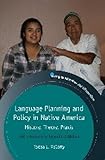Language Planning and Policy in Native America : History, Theory, Praxis / Teresa L. McCarty.
Material type: TextSeries: Bilingual Education & BilingualismPublisher: Bristol ; Blue Ridge Summit : Multilingual Matters, [2013]Copyright date: ©2013Description: 1 online resource (280 p.)Content type:
TextSeries: Bilingual Education & BilingualismPublisher: Bristol ; Blue Ridge Summit : Multilingual Matters, [2013]Copyright date: ©2013Description: 1 online resource (280 p.)Content type: - 9781847698636
- 9781847698643
- Education, Bilingual -- United States
- Indians of North America -- Education -- Planning
- Indians of North America -- Education
- Indians of North America -- Languages -- Revival
- Indians of North America -- Languages -- Social aspects
- Intercultural communication
- Language planning -- United States
- Language planning -- United States
- Language policy -- United States
- Language policy -- United States
- LANGUAGE ARTS & DISCIPLINES / Linguistics / Sociolinguistics
- Indigenous language
- Native America
- language education
- language planning
- language policy
- 306.44/97308997
- PM108.8 .M33 2013
- PM108.8 .M33 2012
- online - DeGruyter
| Item type | Current library | Call number | URL | Status | Notes | Barcode | |
|---|---|---|---|---|---|---|---|
 eBook
eBook
|
Biblioteca "Angelicum" Pont. Univ. S.Tommaso d'Aquino Nuvola online | online - DeGruyter (Browse shelf(Opens below)) | Online access | Not for loan (Accesso limitato) | Accesso per gli utenti autorizzati / Access for authorized users | (dgr)9781847698643 |
Frontmatter -- Dedication -- Contents -- Acknowledgements -- Foreword -- Preface -- 1. Contextualizing Native American LPP: Legal–Political, Demographic and Sociolinguistic Foundations -- 2. Conceptualizing Native American LPP: Critical Sociocultural Foundations -- 3. Native American Languages In and Out of the Safety Zone, 1492–2012 -- 4. Indigenous Literacies, Bilingual Education and Community Empowerment: The Case of Navajo -- 5. Language Regenesis in Practice -- 6. Language in the Lives of Indigenous Youth -- 7. Planning Language for the Seventh Generation -- Appendix 1: Native American Languages Act of 1990/1992 -- Appendix 2: Esther Martinez Native American Languages Preservation Act of 2006 -- Appendix 3: 2 December 2011 Executive Order on American Indian/Alaska Native Education -- References -- Author Index -- Subject Index
restricted access online access with authorization star
http://purl.org/coar/access_right/c_16ec
Comprehensive in scope and rich in detail, this book explores language planning, language education, and language policy for diverse Native American peoples across time, space, and place. Based on long-term collaborative and ethnographic work with Native American communities and schools, the book examines the imposition of colonial language policies against the fluorescence of contemporary community-driven efforts to revitalize threatened mother tongues. Here, readers will meet those who are on the frontlines of Native American language revitalization every day. As their efforts show, even languages whose last native speaker is gone can be reclaimed through family-, community-, and school-based language planning. Offering a critical-theory view of language policy, and emphasizing Indigenous sovereignties and the perspectives of revitalizers themselves, the book shows how language regenesis is undertaken in social practice, the role of youth in language reclamation, the challenges posed by dominant language policies, and the prospects for Indigenous language and culture continuance current revitalization efforts hold.
Mode of access: Internet via World Wide Web.
In English.
Description based on online resource; title from PDF title page (publisher's Web site, viewed 01. Dez 2022)


